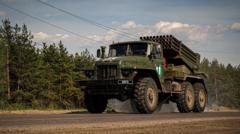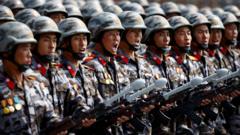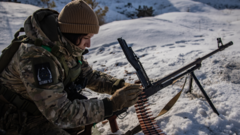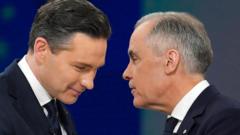As peace talks progress, German Defence Minister Boris Pistorius advises Ukraine not to accept substantial territorial concessions proposed by the U.S., including the recognition of Crimea as Russian territory, citing it as a capitulation to Moscow.
Germany Urges Caution for Ukraine Amidst Potential Territorial Concessions

Germany Urges Caution for Ukraine Amidst Potential Territorial Concessions
German Defence Minister warns against sweeping territorial compromises in ceasefire negotiations with Russia.
Article:
Germany's Defence Minister has issued a stern warning to Ukraine cautioned against reaching a peace agreement that involves sweeping territorial concessions in return for a ceasefire with Russia. Boris Pistorius stated that Ukraine "should not go as far as the latest proposal by the American president," describing such an agreement as tantamount to a "capitulation." This statement comes in the wake of U.S. President Donald Trump's declaration that "most of the major points [of the deal] are agreed to," raising concerns that Ukraine may be pressured to relinquish significant parts of land currently seized by Russia, prominently Crimea.
Ukrainian President Volodymyr Zelensky has consistently rebuffed territorial concessions, asserting that land disputes can only be addressed after a ceasefire has been established. On Sunday, Pistorius, during an interview with German public broadcaster ARD, noted that while Kyiv understands the necessity of potentially parting with some territory for a ceasefire, "they will certainly not go as far - or should not go as far - as the latest proposal by the American president." He emphasized that "Ukraine could have got a year ago what was included in that proposal, it is akin to capitulation. I cannot discern any added value."
Though the full details of the latest U.S. strategy have not been disclosed, Reuters has reported proposals suggesting that the U.S. would formally recognize Russia's illegal annexation of Crimea and its de facto control over other occupied regions in Ukraine, such as Luhansk in the east. Contrarily, Europe and Ukraine are reportedly advocating for a conversation regarding occupied territory only post-ceasefire.
The U.S. plan comes with stipulations, including the exclusion of Ukraine from NATO membership and the establishment of a UK-France led "coalition of the willing" to provide security guarantees after a ceasefire is implemented, without American involvement. European allies have called upon the U.S. to provide "robust" assurances analogous to Article 5 of NATO.
Additionally, the U.S. has proposed managing the Zaporizhzhia nuclear power plant, currently under Russian occupation, with intentions to supply electricity to both Russia and Ukraine. Meanwhile, the European counter-proposal does not mention granting any authority to Russia.
Recently, in an interview with Time magazine, Trump controversially blamed Kyiv for triggering the conflict, asserting that "Crimea will stay with Russia." Underscoring the urgency of negotiations, U.S. Secretary of State Marco Rubio urged both parties to expedite discussions, highlighting the necessity of a timely resolution.
Amid continuing talks, tension remains high as Russia currently holds nearly 20% of Ukrainian territory following the full-scale invasion in 2022, further complicating the path towards peace.
Germany's Defence Minister has issued a stern warning to Ukraine cautioned against reaching a peace agreement that involves sweeping territorial concessions in return for a ceasefire with Russia. Boris Pistorius stated that Ukraine "should not go as far as the latest proposal by the American president," describing such an agreement as tantamount to a "capitulation." This statement comes in the wake of U.S. President Donald Trump's declaration that "most of the major points [of the deal] are agreed to," raising concerns that Ukraine may be pressured to relinquish significant parts of land currently seized by Russia, prominently Crimea.
Ukrainian President Volodymyr Zelensky has consistently rebuffed territorial concessions, asserting that land disputes can only be addressed after a ceasefire has been established. On Sunday, Pistorius, during an interview with German public broadcaster ARD, noted that while Kyiv understands the necessity of potentially parting with some territory for a ceasefire, "they will certainly not go as far - or should not go as far - as the latest proposal by the American president." He emphasized that "Ukraine could have got a year ago what was included in that proposal, it is akin to capitulation. I cannot discern any added value."
Though the full details of the latest U.S. strategy have not been disclosed, Reuters has reported proposals suggesting that the U.S. would formally recognize Russia's illegal annexation of Crimea and its de facto control over other occupied regions in Ukraine, such as Luhansk in the east. Contrarily, Europe and Ukraine are reportedly advocating for a conversation regarding occupied territory only post-ceasefire.
The U.S. plan comes with stipulations, including the exclusion of Ukraine from NATO membership and the establishment of a UK-France led "coalition of the willing" to provide security guarantees after a ceasefire is implemented, without American involvement. European allies have called upon the U.S. to provide "robust" assurances analogous to Article 5 of NATO.
Additionally, the U.S. has proposed managing the Zaporizhzhia nuclear power plant, currently under Russian occupation, with intentions to supply electricity to both Russia and Ukraine. Meanwhile, the European counter-proposal does not mention granting any authority to Russia.
Recently, in an interview with Time magazine, Trump controversially blamed Kyiv for triggering the conflict, asserting that "Crimea will stay with Russia." Underscoring the urgency of negotiations, U.S. Secretary of State Marco Rubio urged both parties to expedite discussions, highlighting the necessity of a timely resolution.
Amid continuing talks, tension remains high as Russia currently holds nearly 20% of Ukrainian territory following the full-scale invasion in 2022, further complicating the path towards peace.






















